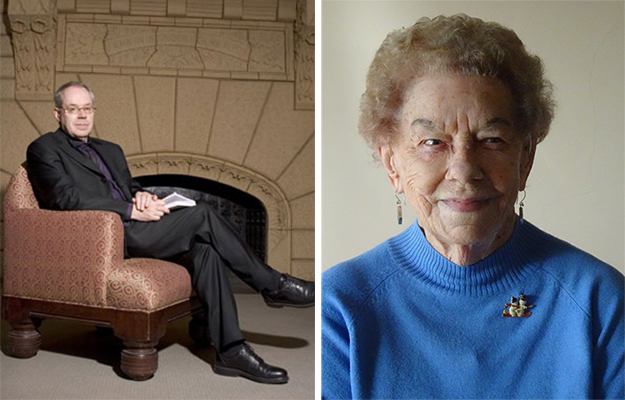The Death of a Princess
We asked English Professor David Wallace—and his mum—about the death of Princess Diana 20 years ago.
On August 31, 1997, Diana, Princess of Wales, died following a car accident in Paris. The reaction in the United Kingdom and around the world was extraordinary. Billions of people watched her funeral. The actions of Queen Elizabeth II and the royal family, while following traditional protocol, were interpreted as unfeeling, and the resulting outrage seemed almost to shake the monarchy.
We talked to David Wallace, Judith Rodin Professor of English, about Princess Diana’s death and her lasting legacy. Wallace's commitment to all things European led to eight years of collaborative effort to edit Europe: A Literary History 1348-1418, published in 2016. This month his new book, Geoffrey Chaucer: A New Introduction, takes a fresh look at the author’s life and work. He is a Fellow and First Vice President of the Medieval Academy of America.
Since Wallace was visiting his mother in the southwest of England this summer, he shared the questions with her as well. Beryl Wallace, aged 90, was a member of the Women's Land Army in World War II and is still fighting fit.
What impact did Diana’s death have on England?
David Wallace: The film The Queen, directed by Stephen Frears, did not appear until 2006, but it has strongly shaped people's memories of the crucial day. Polls in 1997 did suggest that the slow response by the Queen and her advisors strongly alienated public opinion.
Beryl Wallace: Only for a short time. The worst part was the gap between Diana's death and the queen returning from Balmoral [Castle, in Scotland, where the royal family had been on summer holiday].
What role was the media seen to have played in her death at the time?
DW: A huge and paradoxical part—because it was media, specifically in the shape of paparazzi, that pressured Diana and then precipitated her death in the Paris tunnel.
BW: Quite a big part.
Did the accident impact how the media covered celebrities, or at least the royal family?
BW: I’m not sure. It was a great shame the boys had to walk behind their mother’s coffin.
DW: Yes. There has been a series of scandals in the U.K. about ways in which celebrities are followed, trolled, have their phones tapped, answering machines hacked, et cetera. Actors and celebrities such as Hugh Grant have taken a leading role in seeking to tighten the law. But it does seem that the new royal infants, George and Charlotte, have been left in peace. William and Kate control access and exposure closely, and this seems to be respected.
Twenty years later, has the media’s approach changed in any way?
DW: The young royals have been proactive in shaping media perceptions. A number of documentaries have been made; the first, Diana, Our Mother: Her Life and Legacy, was produced by ITV (U.K.) and HBO and aired in England this July. This film is striking for the near-absence of reference to Charles and Camilla and the foregrounding of Diana's work as a humanitarian.
Did Diana’s life and death change the monarchy?
DW: The English monarchy has shown an amazing capacity to morph, adapt, and survive. The disastrously lonely education to which young Prince Charles was subjected at a private school in a remote location, Gordonstoun, was not inflicted on William and Harry, nor will they impose such a regimen on their children.
BW: Hmmmm – I’m not sure.
What is Diana’s legacy?
DW: Her sons, through continuing her charitable work and in emphasizing her role as a humanitarian, would like to have her remembered as a force for good. But Diana was above all a celebrity, and once she was gone the media circus moved on. It is actually striking how little she is referenced in the U.K., except on these anniversaries. That said, Diana's work with AIDS patients, embracing them when others stayed back, and in protesting use of land mines was ahead of its time, and cutting edge: the U.K. is still a major manufacturer and provider of anti-personnel weaponry. She deserves respect for this.
BW: She’s remembered as a force for good and as a devoted mother. She loved her kids above all else.
What is the British people’s view of the monarchy today?
BW: Personally, I am great royalist. The country would be much worse off without the monarchy.
DW: I am not a great royalist. I believe that the real crisis for the monarchy will come with the passing of the Queen. Will the public embrace King Charles III? What role, what title, will be devised for Camilla? Will countries such as Canada, Australia, New Zealand, islands in the Caribbean—who have held back out of respect for Queen Elizabeth—revise their constitutional arrangements, change their flag? This will have serious consequences in Britain, since a chief hope or fantasy of those who voted for Brexit (withdrawal from the European Union) was a revival of a wider, global role associated with “the Commonwealth” (always dear to QE2's heart). There may be no Commonwealth for Charles III to govern; England may then more resemble an isolated and eccentric little country, turned in on itself.
Time will tell! Ask me again in five years.
Photo of flowers at Kensington Palace on 9/1/97: Maxwell Hamilton



